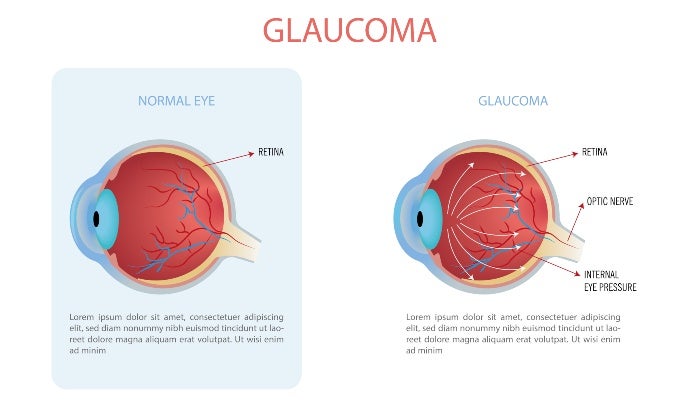Glaucoma Laser Eye Surgery in Derry, NH & Surrounding Areas
Safe, Effective Laser Glaucoma Surgery
Glaucoma can cause swift, irreversible changes in vision. Vision loss can disrupt your daily routine, making working or enjoying your hobbies hard. At Spindel Eye Associates in Derry, Windham, Raymond, and Londonderry, NH, our experienced ophthalmologists have decades of experience diagnosing and treating glaucoma. We specialize in glaucoma surgery and offer laser surgery for glaucoma that can slow or prevent complete vision loss. Our glaucoma surgery procedures can give you the relief you need to take back your life and start living it to the fullest again.
What Is Glaucoma?
Glaucoma is a group of eye conditions that cause significant and irreversible damage to the optic nerve. The optic nerve is responsible for sending visual information from your eye to your brain. High pressure in the eye, caused by glaucoma, can damage the optic nerve and affect vision. Glaucoma can occur even with normal eye pressure, however. The condition is most common in people over 60 but can occur at any age. There might not be any warning signs, or the symptoms might be so gradual that you don’t notice vision changes until the condition is in an advanced stage. Scheduling regular eye exams that include eye pressure measurements can detect early warning signs of glaucoma so that it can be slowed and vision loss can be prevented.
Causes of Glaucoma
The main cause of glaucoma is improper drainage of a fluid called aqueous humor. This fluid should drain out from the eye through an area called the drainage angle. Drainage maintains stable eye pressure. Without proper drainage, fluid builds up and causes pressure in the eye to rise, damaging the optic nerve. You are at a higher risk of glaucoma if you:

- Sustain an eye injury.
- Are over 40 years old.
- Use steroids long-term.
- Have high eye pressure.
- Are nearsighted or farsighted.
- Have a family history of glaucoma.
- Have thinning corneas or optic nerves.
- Are of African, Hispanic, or Asian heritage.
- Have diabetes, migraines, high blood pressure, poor circulation, or other chronic problems that affect the whole body.
Symptoms of Glaucoma
There are several different types of glaucoma, and each has different symptoms:
- Open-Angle Glaucoma
- No symptoms in the earliest stages.
- Later stages cause trouble seeing things in central vision.
- Later stages cause gradual, patchy vision loss or blind spots in peripheral vision.
- Acute Angle-Closure Glaucoma
- Red eyes.
- Blurry vision.
- Nausea or vomiting.
- Halos or rings around lights.
- Severe headaches or migraines along with severe eye pain.
- Normal-Tension Glaucoma
- Blurry vision.
- No symptoms in the earliest stages
- Later stages cause loss of peripheral vision.
- Pigmentary Glaucoma
- Halos or rings around lights.
- Blurry vision during exercise.
- Gradual loss of peripheral vision.
- Glaucoma In Children
- Headaches.
- Blurry vision.
- Increased blinking.
- Dull or cloudy eyes.
- Tears without crying.
- Worsening nearsightedness.
How Is Glaucoma Diagnosed?
Glaucoma is diagnosed through a comprehensive eye exam. During the exam, your eye doctor or ophthalmologist will measure your eye pressure, inspect your eye’s drainage angle, examine your optic nerve, test your peripheral vision, and measure your optic nerve and corneal thickness.
Glaucoma Treatment Options
Glaucoma can be treated with medication administered via eye drops. This medication will lower eye pressure by reducing aqueous fluid levels or helping fluid drain more effectively. These medications can slow the progression of glaucoma and prevent further vision loss, but they will not restore vision that is already lost.
Laser Surgery for Glaucoma
Another effective glaucoma treatment option is laser surgery for glaucoma. This surgery can be performed at your ophthalmologist’s office or an outpatient surgery center. The two types of laser eye surgery for glaucoma are:
- Selective Laser Trabeculoplasty – This glaucoma surgery is for patients with open-angle glaucoma. It can replace or supplement glaucoma medication. Your eye surgeon will use a laser to improve drainage angles.
- Iridotomy – This glaucoma surgery is for patients who have angle-closure glaucoma. Your eye surgeon will use a laser to make a small hole in the iris, which helps fluid flow to the drainage angle.
What Can I Expect During Glaucoma Laser Surgery?
Your glaucoma surgery may be done in an operating room or as an outpatient procedure at your ophthalmologist’s office. Your eye surgeon will administer numbing eye drops. You will sit in front of a laser device, and your glaucoma surgeon will place a mirrored contact lens in your eye. They will hold a special laser light to your eye. This laser will either create a tiny hole in your iris to improve drainage or will use the laser to make the drainage angle work better. After the laser glaucoma procedure, the mirrored contact lens is removed, and the eye is rinsed. Your eye surgeon will then check the pressure of your eye again.
Schedule a Consultation for Glaucoma Treatment
If you suspect you have glaucoma or want to discuss your options for glaucoma treatment in Derry, Windham, Raymond, or Londonderry, NH, call us today. If you have an urgent concern, our on-call doctor will be paged. Our experienced team of ophthalmologists has years of experience diagnosing glaucoma and can find the safest and most effective glaucoma treatment option based on your age, symptoms, and overall health. Our goal is to maintain your vision and slow the progression of glaucoma.
